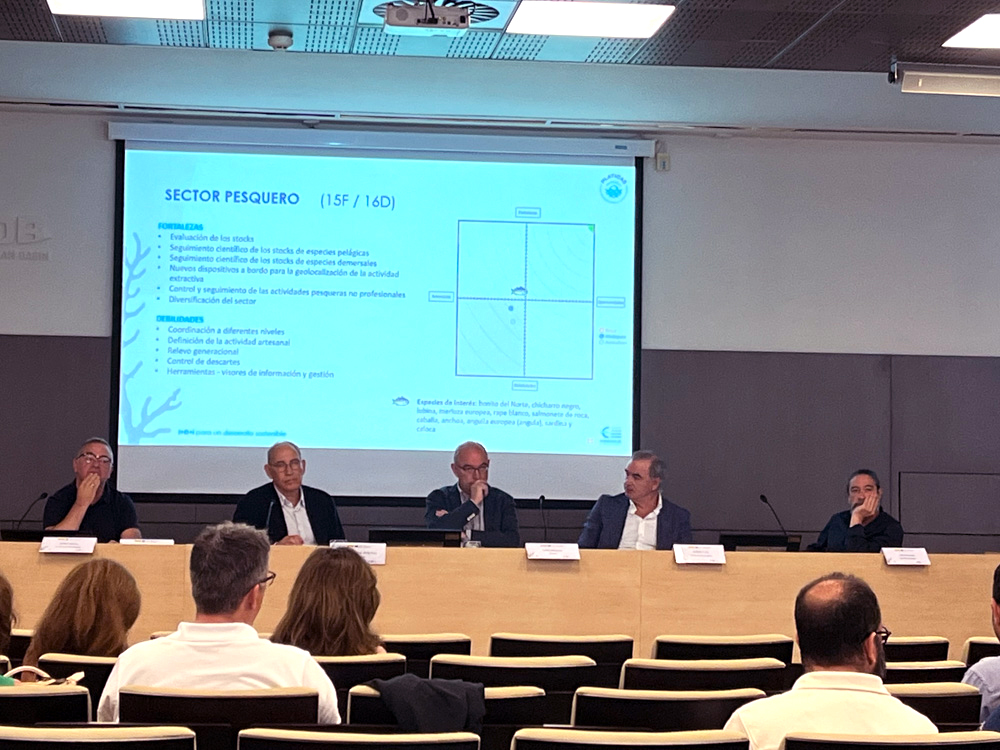NEWS
First Conference on Blue Economy in Cantabria: Progress and future held at IHCantabria
From left to right:
- Rubén Aldaco. Chemical Process Development and Contaminant Control Group, UC.
- José A Juanes. coordinator of the PLATICAS project, IHCantabria, UC.
- Pablo Abaunza. Santander Oceanographic Center, CSIC-IEO.
- Ladislao Luna. Economic Management Group for the Sustainable Development of the Primary Sector, UC.
- Carlos Mazorra. SMARTWATER PLANET
The aim of the conference was to bring together the different actors involved in the Blue Economy in Cantabria to present the PLATICAS project and discuss the preliminary results of the sectoral diagnoses of the fishing, shellfish and aquaculture sector in Cantabria.
The call for the first Conference on Blue Economy in Cantabria is an initiative promoted by the project “Inter-territorial Atlantic Platform for Sustainable Blue Growth (PLATICS)”, whose general objective is focused on the development of an Inter-territorial Platform to support the standardization, integration, management, communication and transfer of knowledge on Sustainable Blue Growth.
Under the slogan “Progress and Future”, the “First Conference on Blue Economy in Cantabria” was held on July 11. This event brought together in the Auditorium of IHCantabria more than 60 actors from different areas related to the Blue Economy in Cantabria, who shared knowledge, exchanged ideas and established connections with other professionals interested in the subject.
José María Solano, representative of the General Secretariat of Fisheries of the Spanish Ministry of Agriculture, Fisheries and Food, highlighted the importance of the existence of the Knowledge Spaces on Sustainable Blue Growth (EoC). These structures act as catalytic instruments for progress towards an inclusive and collaborative blue economy, as they aim to promote the exchange of experiences and knowledge that interrelate the entire fisheries and aquaculture value chain, thus facilitating professional development within the sector thanks to this transfer of knowledge.
In this context of collaboration and knowledge transfer, the PLATICAS project was created, which arose from the grouping of the seven Knowledge Spaces of the regions of the Spanish Atlantic coast. To facilitate communication and interaction between the different stakeholders in the fisheries and aquaculture sectors, the RECCA platform was created within the framework of the PLATICAS project. The expectation is that RECCA will facilitate and be a meeting point for those promoting the development of the Blue Economy in this autonomous community, according to Francisco Royano, director of Technology Transfer at IHCantabria.
José A. Juanes of IHCantabria, coordinator of the project, presented the preliminary results of the sectoral diagnoses of the fishing, shellfish and aquaculture sector in Cantabria, which were later discussed at two round tables. These diagnoses have made it possible to recognize, from the point of view of knowledge, the strengths and weaknesses of our coastal systems, as well as the magnitude of the main threats and the opportunities associated with collaboration between territories and between agents.
This diagnosis has been able to highlight the most relevant aspects: weaknesses, threats, strengths and opportunities. It should be mentioned that it represents an analysis biased towards the knowledge sector, but this was the objective from the beginning of the project.
Two round tables promoted a collaborative debate among representatives of the different areas of the blue economy (research, administration, production sector, etc.). The roundtable discussions highlighted the need to extend this analysis to the value and supply chain, issues related to generational replacement and the importance of dignifying employment in these sectors. The region of Cantabria has also been valued at the aquaculture sector level, since it is considered that we have a very capable sector at a technical and scientific level, with many capabilities, some of which we do not even value too much.
During the conference, information was also provided on the Complementary Plan for R+D+i in Marine Sciences (PCM), or ThinkInAzul. Luis Valdés, director of the Santander Oceanographic Center (IEO-CSIC) and scientific coordinator of the program in Cantabria, referred to the general context of the PCM. Three projects related to fisheries and aquaculture were presented; one was presented by Inmaculada Rasines, on behalf of the IEO-CSIC, while the other two were presented by Alberto Coz and Ladislao Luna, who participated on behalf of the University of Cantabria. The ThinkInAzul program, funded by the Ministry of Science and Innovation, aims to sustainably and cooperatively address new challenges in marine research, aquaculture, new technologies, the blue economy and impacts on the marine environment. The complete day can be viewed at the following link. See the program.
The PLATICAS project is financed by the Spanish Ministry of Agriculture, Fisheries and Food and by the European Union, with funds from the Spanish Recovery, Transformation and Resilience Plan, through the NextGenerationEU funds. This project is coordinated by the Institute of Environmental Hydraulics of the University of Cantabria(IHCantabria).), leader of the EoC in Cantabria, and has as partners those responsible for the rest of the areas declared by the Ministry in each region; It therefore includes the AZTI Foundation in the Basque Country, the University of Oviedo in the Principality of Asturias, the Port Authority of Vigo and the Sea Technology Center-CETMAR Foundation in Galicia, the University of Cadiz in Andalusia and the Oceanic Platform of the Canary Islands (PLOCAN) -in this case in collaboration with the University of Las Palmas de Gran Canaria- on the island level.




